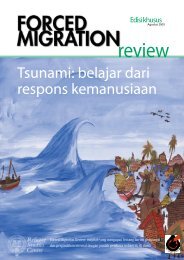FMR 42 full issue pdf - Forced Migration Review
FMR 42 full issue pdf - Forced Migration Review
FMR 42 full issue pdf - Forced Migration Review
You also want an ePaper? Increase the reach of your titles
YUMPU automatically turns print PDFs into web optimized ePapers that Google loves.
62 Sexual orientation and gender identity and the protection of forced migrants<br />
<strong>FMR</strong> <strong>42</strong><br />
These data raise several <strong>issue</strong>s. First, SOGI<br />
<strong>issue</strong>s are still emerging in the field of<br />
forced migration. As is the case with <strong>issue</strong>s<br />
where the obligation on states is still not<br />
settled, private funding, though small, will<br />
precede and exceed public funding. When<br />
governments establish LGBT people as a target<br />
of programming, the funding programmes<br />
will shift to incorporate SOGI <strong>issue</strong>s. Second,<br />
even among private funders those most<br />
active in the field of forced migration are<br />
not engaging in these <strong>issue</strong>s. Third, the<br />
current amount of funding, as well as the<br />
size of grants by funders in the SOGI field,<br />
is insufficient to support certain projects.<br />
Recommendations for funders<br />
These funding patterns present opportunities<br />
for funders, particularly private funders. First,<br />
private funding has been and can continue<br />
to be the primary source of support for<br />
activities to document and publicise trends<br />
of violence and discrimination as well as<br />
the establishment of networks within which<br />
LGBT people can identify themselves. In the<br />
same way that private funding has supported<br />
the development of demographic research<br />
techniques in the field of health and censustaking<br />
for LGBT people, private funding<br />
could also support the development, testing<br />
and validation of interview and investigatory<br />
guidelines regarding the complex area of<br />
sexual orientation and gender identity.<br />
Second, private funders, through NGOs,<br />
could support professional development<br />
and training for staff at UNHCR and<br />
local agencies throughout the world.<br />
Until SOGI <strong>issue</strong>s are considered part<br />
of the core practice of agencies dealing<br />
with forced migration, such programmes<br />
will often require outside assistance. As<br />
policy develops in this area, training and<br />
knowledge acquisition will be crucial.<br />
Third, private funders can support the<br />
development of practices surrounding asylum<br />
claims, detention and status determination by<br />
providing representation to displaced persons.<br />
The funding role here is not to provide<br />
generalised services but rather to provide<br />
services with the goal of raising <strong>issue</strong>s of<br />
practice in agencies working in this area,<br />
where their expertise does not include<br />
SOGI <strong>issue</strong>s.<br />
Last, funders whose primary grantmaking<br />
activities are in forced migration <strong>issue</strong>s<br />
currently have the ability to strategically<br />
advance SOGI <strong>issue</strong>s with a small number of<br />
grantmaking decisions. Until funding patterns<br />
change, the opportunities to establish models<br />
and precedent will remain strong. These<br />
funders hold a high degree of expertise and<br />
can guide initial innovations in the field.<br />
We should note two potential caveats for the<br />
use of private funding for the support of LGBT<br />
individuals facing displacement. First, private<br />
funding, given that grants are usually small<br />
one-time disbursements, may increase risk.<br />
Such a grant may support an LGBT person<br />
to leave immediate danger, only to have the<br />
person fall short of a durable solution or be<br />
placed in a situation where their long-term<br />
vulnerability is increased. Secondly, private<br />
funders cannot be held accountable for<br />
whether their decisions – where and how to<br />
spend their funds – conform to international<br />
norms concerning displaced persons.<br />
Andrew Park apark@wellspringadvisors.com is<br />
Program Director, SOGI Programs, Wellspring<br />
Advisors, LLC www.wellspringadvisors.com<br />
1. This article relied on the following sources: Funders for Lesbian<br />
and Gay Issues A Global Gaze: Lesbian, Gay, Bisexual, Transgender<br />
And Intersex Grantmaking In The Global South And East 2010<br />
www.lgbtfunders.org/files/A_Global_Gaze_2010.<strong>pdf</strong> as well as<br />
an internet search of the Foundation Center Philanthropy/Insight<br />
interactive map www.philanthropyinsight.org<br />
A donation to <strong>FMR</strong>?<br />
<strong>FMR</strong> is funded entirely by donations and grants. Your donation would help <strong>FMR</strong> continue to share experience<br />
and expertise across the world and across sectors. Whether you consider it a donation to cover the cost of your<br />
own copy or to help us get copies to local organisations or policymakers around the world, every bit helps.<br />
We suggest £30/$45 a year for the <strong>full</strong> print <strong>issue</strong> or £20/$30 if you receive <strong>FMR</strong> Listing or read <strong>FMR</strong> online.<br />
Please visit our secure online giving site at www.giving.ox.ac.uk/fmr or email us at fmr@qeh.ox.ac.uk Thank you!




